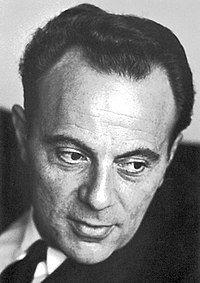
Date of appointment: 24 july 1992.
By proposal of: Faculty of Biological Sciences.
Date of investiture: 29 january 1993.
Sponsor: Dr. Luís Franco Vera and Dr. José Luís Mensua Fernández.
François Jacob (Nancy, June 17, 1920 - Paris, April 19, 2013). Doctor and French biologist, awarded the Nobel Prize in Medicine in 1965, which he shared with André M. Lwoff and Jacques L. Monod, for their discoveries on the genetic control of enzyme synthesis and virus synthesis.
During the German occupation of France, Jacob left France to Britain to join the war. Jacob, who had only completed his second year of medical studies, joined the medical company of the 2nd French Armored Division in 1940. For his service during the war, he was awarded the highest decoration in France for his courage, the Cross of Liberation, as well as the Legion of Honor and the Croix de guerre. He was also a prisoner of the Miranda de Ebro concentration camp.
After his recovery, Jacob returned to medical school and began to investigate thyrothricin and learning the methods of bacteriology. He completed his thesis on the effectiveness of antibiotics against local infections, and graduated as a medical doctor in 1947. Although attracted to research as a career, he was discouraged by his own perceived ignorance after attending a microbiology conference that summer. . Instead, he took a position at the Cabanel Center, where he had done his thesis research, his new job involving the manufacture of antibiotics, thyrothricin. Later, the center was contracted to convert the powder factories for the production of penicillin.
In 1961, Jacob and Monod explored the idea that controlling the expression levels of enzymes in cells is the result of feedback on the transcription of DNA sequences. His experiments and ideas boosted the emerging field of molecular biology of development and transcriptional regulation in particular. With the previous determination of the structure and central importance of DNA, it became evident that all proteins were produced in some way from their genetic code, and that this step could form a key control point. Jacob and Monod made key experimental and theoretical discoveries that showed that in the case of the lactose system described above (in the bacterium Escherichia coli), there are specific proteins that are dedicated to the repression of the transcription of DNA to RNA, preventing in turn that is decoded in the protein). This repressor (the lac repressor) exists in all cells.
Jacob and Monod extended this repressive model to all the genes of all organisms. The regulation of the activity of genes has become a great sub-discipline of molecular biology.











